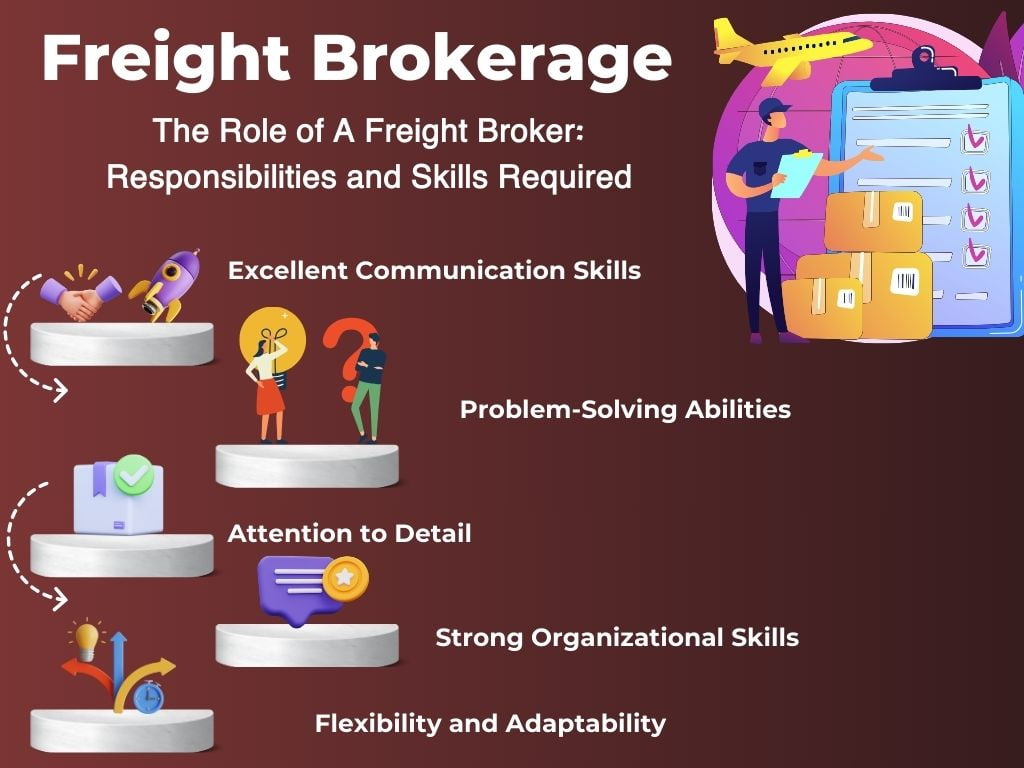What is freight brokerage and How to Become a Freight Broker in 2024
The Rising Role of Freight Brokerage in the Logistics Industry
A blog post exploring the significance of freight brokerage in today’s logistics landscape and providing a step-by-step guide on how to become a freight broker in 2024.
Introduction
In the world of logistics and transportation, freight brokerage plays a crucial role in connecting shippers with carriers. But what exactly is a freight brokerage, and how can you become a part of this thriving industry in 2024? This blog post will provide you with a comprehensive overview of freight brokerage, including its definition, functions, and the steps you can take to become a successful freight broker in the coming years. Whether you are a seasoned professional looking to switch careers or an aspiring entrepreneur eager to enter the industry, this article will guide you through the ins and outs of freight brokerage and set you on the path to success.
What is freight brokerage and why is it important in the logistics
Freight brokerage plays a crucial role in the logistics industry, serving as the intermediary between shippers and carriers. In simple terms, a freight broker is a middleman who connects businesses in need of transportation services with reliable carriers that can meet their shipping requirements. Instead of managing its own fleet of trucks.
A freight brokerage leverages its expertise and network to match shippers with carriers, ensuring that the goods are transported efficiently and cost-effectively.
One of the key reasons why freight brokerage is important in the logistics industry is its ability to provide flexibility and scalability to businesses. By outsourcing their transportation needs to freight brokers, companies can focus on their core competencies while leaving the complexities of shipping logistics to the experts. This allows businesses to adapt quickly to changing market conditions and scale their operations as needed without the burden of managing their own fleet.
Freight brokers also bring value through their extensive network of carriers. They have established relationships with a wide range of carriers, from small local operators to large national and international transportation companies. This network enables them to find the best carrier for each specific shipment, considering factors such as price, capacity, and reliability.
By leveraging their network, freight brokers can negotiate competitive rates and ensure that shipments are handled by trusted carriers, minimizing the risk of delays or damage to the goods.
Furthermore, freight brokerage provides a level of expertise and knowledge in navigating the complex world of transportation regulations and requirements. Brokers stay up-to-date with the latest industry regulations, such as permits, customs documentation, and safety compliance, ensuring that shipments comply with all necessary regulations. This expertise helps businesses avoid costly penalties and delays that can result from non-compliance.
The role of a freight broker: responsibilities and skills required.
The role of a freight broker: responsibilities and skills required In the world of logistics, a crucial player that ensures the smooth movement of goods from point A to point B is a freight broker.
But what exactly is a freight broker and what do they do? Let’s delve into the responsibilities and skills required to become a successful freight broker. At its core, a freight broker acts as a middleman between shippers and carriers, facilitating the transportation of goods.
They serve as the vital link that connects businesses in need of shipping services with the appropriate carriers that can efficiently transport their cargo. One of the primary responsibilities of a freight broker is to establish and maintain strong relationships with both shippers and carriers. This involves actively seeking out new clients and carriers, negotiating contracts, and ensuring that all parties involved in the transportation process are satisfied with the services provided.
To excel in this role, a freight broker must possess a diverse set of skills:
1) Excellent Communication Skills
As the intermediary between shippers and carriers, a freight broker needs to effectively communicate with both parties to ensure smooth operations. Clear and concise communication is essential when negotiating rates, coordinating shipments, and resolving any issues that may arise during transportation. A freight broker must be able to convey information, such as pickup and delivery instructions, shipment details, and any special requirements, to both shippers and carriers. Additionally, they must be skilled in active listening to understand the needs and preferences of their clients. Whether it is through phone calls, emails, or face-to-face meetings, a freight broker’s ability to communicate effectively and professionally sets the foundation for successful transactions and long-term partnerships.
2) Problem-Solving Abilities
Freight brokers often find themselves in challenging situations that require quick thinking and effective problem-solving skills. Whether it’s dealing with unexpected delays, finding alternative routes for shipments, or resolving issues with customs and regulations, the ability to think critically and come up with practical solutions is essential. A skilled freight broker understands the complexities of the logistics industry and can think outside the box to overcome obstacles and ensure smooth operations. They must possess excellent analytical skills to assess the situation, identify potential roadblocks, and develop strategies to overcome them.
3) Attention to Detail
Attention to detail is an essential skill that every freight broker must possess. In the fast-paced world of logistics and transportation, even the smallest oversight or mistake can have significant consequences. Freight brokers are responsible for coordinating the movement of goods from one location to another, ensuring that everything runs smoothly and efficiently. This requires careful attention to detail in every aspect of their work. From accurately recording and verifying shipment information to properly documenting contracts and agreements, a freight broker must be meticulous in their approach. They must also pay close attention to the specific requirements and regulations of different shipments, such as weight restrictions, hazardous materials, and delivery deadlines. By being detail-oriented, a freight broker can effectively anticipate and address any potential issues that may arise, ensuring the successful and timely delivery of goods for their clients.
4) Strong Organizational Skills
Your ability to stay organized and keep all the moving parts of the logistics process in order will directly impact the success of your business. This includes creating and maintaining detailed records, keeping track of contracts and agreements, and effectively managing your time and resources. Strong organizational skills also enable you to handle unexpected challenges and changes in schedules or routes, ensuring that shipments are delivered on time and without any hiccups. Additionally, being well-organized allows you to provide efficient and reliable service to your clients, building trust and long-term relationships. Therefore, as a freight broker, honing your organizational skills is essential for thriving in this fast-paced and demanding industry.
5) Flexibility and Adaptability
Flexibility and adaptability are two essential skills that every professional must possess. The nature of the industry demands constant adjustments and quick thinking to navigate various challenges and changes that may arise. A freight broker must be flexible in their approach, being able to adapt to different situations and find creative solutions to unexpected problems. This includes adjusting routes, and schedules, and negotiating deals to meet the unique needs of each client and shipment.
By mastering these skills and understanding the intricacies of the transportation industry, aspiring freight brokers can embark on a rewarding career in this dynamic field.
Steps to becoming a freight broker in 2024
1) Understand the industry and obtain relevant knowledge.
2) Complete required training and education.
3) Obtain necessary licenses and certifications.
4) Build a strong network and establish relationships with carriers and shippers.
5) Develop effective negotiation and communication skills.
6) Utilize technology and software to streamline operations.
Tips for success as a freight broker:
1) Continuously stay updated on industry trends and regulations.
2) Provide exceptional customer service to build trust and loyalty.
3) Utilize data analysis and market research to make informed decisions.
4) Develop strategies for expanding your client base and maintaining profitability.
5) Network and collaborate with other professionals in the industry.
Conclusion
We hope you found our blog post informative and helpful in understanding the world of freight brokerage. As the demand for transportation services continues to grow, becoming a freight broker can be a lucrative and rewarding career choice. By following the steps outlined in our blog, you can set yourself on the path to success in the freight brokerage industry. If you have any further questions or need additional guidance, please don’t hesitate to reach out to us. Thank you for reading, and we wish you the best of luck in your journey to becoming a freight broker in 2024 and beyond!

